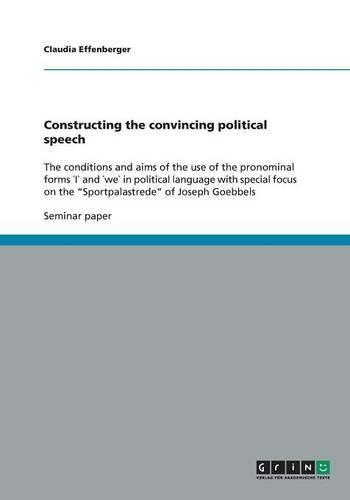Readings Newsletter
Become a Readings Member to make your shopping experience even easier.
Sign in or sign up for free!
You’re not far away from qualifying for FREE standard shipping within Australia
You’ve qualified for FREE standard shipping within Australia
The cart is loading…






This title is printed to order. This book may have been self-published. If so, we cannot guarantee the quality of the content. In the main most books will have gone through the editing process however some may not. We therefore suggest that you be aware of this before ordering this book. If in doubt check either the author or publisher’s details as we are unable to accept any returns unless they are faulty. Please contact us if you have any questions.
Seminar paper from the year 2006 in the subject English Language and Literature Studies - Linguistics, grade: 1,0, University of Cologne (Englisches Seminar), course: Sociolinguistics, 8 entries in the bibliography, language: English, abstract: If today one thinks of politics, politicians and their language there is one opinion that always comes first: All politicians are liars They are smooth-talkers who promise things they cannot fulfil only to get more votes in the coming-up election and they use beautiful words to paraphrase and disguise social injustices. And in some points this opinion is right. There really is a specific political language used by the politicians to follow certain aims but this has not always to be disguise or circumscription. What many of the citizens simply ignore is the fact, that politicians are dependent from the mass. Without the public there would be no need for politicians. And the same goes for political discussions. Politicians don’t argue with each other because they like it. It is always the fact that a political actor starts political relations with another actor and at the same time with the public. If two politicians talk to each other on the television this is always orchestrated for the people who watch the show. (see Dieckmann 1981: 265) The main reason for every politician to lie or to use special vocabulary is for the purpose of being convincing. This paper analyses the language used by politicians in certain situations to convince people of the correctness of their point of view, in its’ roots, mainly based on the book Politically Speaking: The Pragmatic analysis of Political Language by John Wilson. The main focus of this paper is put to the question of the use of the pronominal forms I" and we" in political talk, under which conditions the one is used and when the other and what for. It is not arguable that politicians always have a reason for using I" or we" in different contexts, especially in written speeches tha
$9.00 standard shipping within Australia
FREE standard shipping within Australia for orders over $100.00
Express & International shipping calculated at checkout
This title is printed to order. This book may have been self-published. If so, we cannot guarantee the quality of the content. In the main most books will have gone through the editing process however some may not. We therefore suggest that you be aware of this before ordering this book. If in doubt check either the author or publisher’s details as we are unable to accept any returns unless they are faulty. Please contact us if you have any questions.
Seminar paper from the year 2006 in the subject English Language and Literature Studies - Linguistics, grade: 1,0, University of Cologne (Englisches Seminar), course: Sociolinguistics, 8 entries in the bibliography, language: English, abstract: If today one thinks of politics, politicians and their language there is one opinion that always comes first: All politicians are liars They are smooth-talkers who promise things they cannot fulfil only to get more votes in the coming-up election and they use beautiful words to paraphrase and disguise social injustices. And in some points this opinion is right. There really is a specific political language used by the politicians to follow certain aims but this has not always to be disguise or circumscription. What many of the citizens simply ignore is the fact, that politicians are dependent from the mass. Without the public there would be no need for politicians. And the same goes for political discussions. Politicians don’t argue with each other because they like it. It is always the fact that a political actor starts political relations with another actor and at the same time with the public. If two politicians talk to each other on the television this is always orchestrated for the people who watch the show. (see Dieckmann 1981: 265) The main reason for every politician to lie or to use special vocabulary is for the purpose of being convincing. This paper analyses the language used by politicians in certain situations to convince people of the correctness of their point of view, in its’ roots, mainly based on the book Politically Speaking: The Pragmatic analysis of Political Language by John Wilson. The main focus of this paper is put to the question of the use of the pronominal forms I" and we" in political talk, under which conditions the one is used and when the other and what for. It is not arguable that politicians always have a reason for using I" or we" in different contexts, especially in written speeches tha